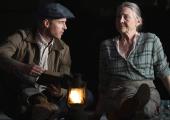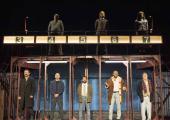The Importance of Being Earnest, National Theatre review - no shortage of acid-tipped delight

Oscar Wilde speaks just as strongly to the 21st century as he did to his own
If Harold Pinter’s work represents, as he slyly joked, the weasel under the cocktail cabinet, then Oscar Wilde’s represents the stiletto in the Victorian sponge – at a time when the stiletto was a slim dagger used for assassination. Beneath the fopperies and fripperies of his fin-de-siècle classic, every line draws blood as he skewers the false gods and hypocrisies of his age.








